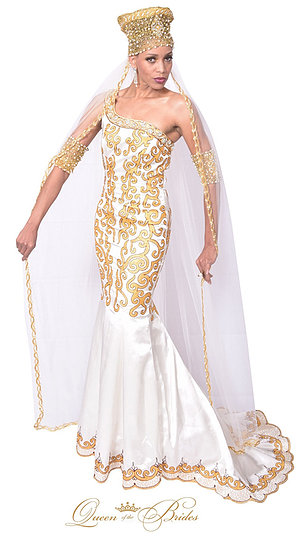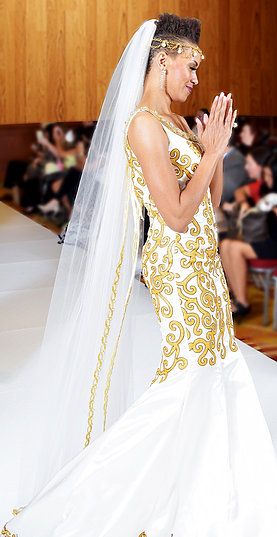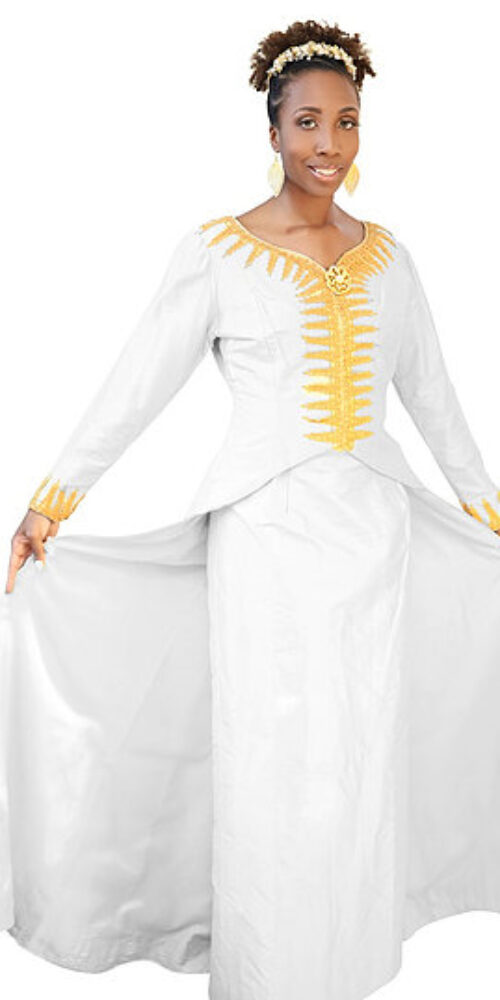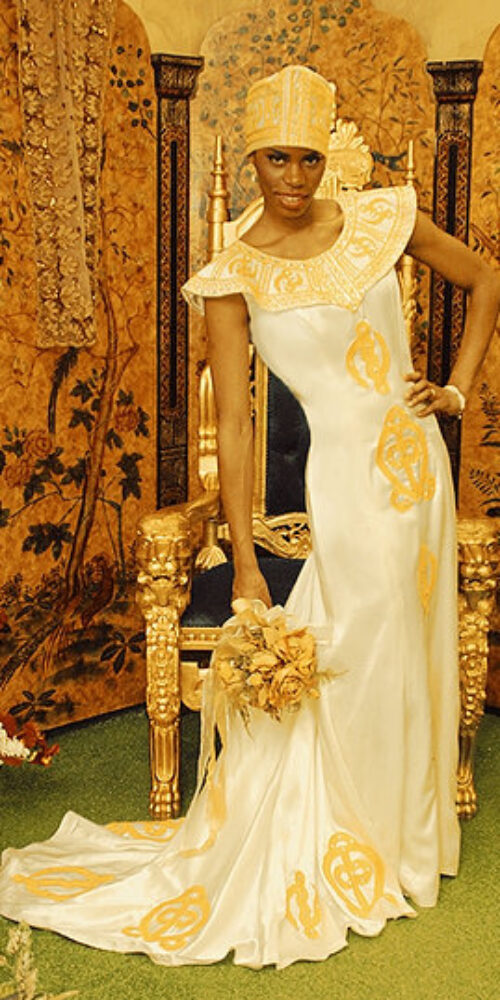PROD1502
$999.00
Description
This couture bridal gown is named after Queen Mbande Zinga of Angola. Elaborate gold embroidery is stitched on the front and back of this royal couture wedding dress. This dress has an asymmetrical neckline adorned with gold and clear crystal and rhinestone trim. Lined. Corset in back. Veil, headpiece and jewelry sold separate. A Queen Of The Brides exclusive. Custom made. all sales final. Order now.
| Special Instruction |
| CUSTOM MADE: Please provide your measurement swith order including: Upper Bust, Bust, Waist, Hip, Dress Length, Shoulder to upper bust, Shoulder to waist, shoulder to hip, Shoulder to floor, and Shoulder / Back. Please allow 12 weeks for delivery from order date. Queen Mbande Zinga was the sister and advisor of the king of Ngola (today Angola) and served as his representative in negotiating treaties with the Portuguese. She became queen in 1624 and appointed women, including her two sisters Kifunji and Mukumbu, to all government offices.
When the Portuguese broke the peace treaty, she led her largely female army against them while also conquering nearby kingdoms in an attempt to build a strong enough confederation to drive the Portuguese out of Africa. She accepted a truce and then agreed to a peace treaty in 1635. She continued to rule her people and lived to be 81. When Angola became an independent nation in 1975, a street in Luanda was named in her honor. |
Additional information
| Made | Custom Made |
|---|---|
| Size | X-Small (1-4), Small (6-8), Medium (10-12), Large (14-16), X-Large (18), 1X (20), 2X (22), 3X (24) |
| Color | Shown |
| Please provide exact measurements in inches please. | Enter N/A if not applicable. |
|---|---|
| 1. Size | ? |
| 2. Height | __ feet __ inches |
| 3. Upper Bust | ? |
| 4. Bust | (Around fullest part of breast – front and back) |
| 4a. Front Bust | (Measure front part of breast from side seam to side seam) |
| 4b. Back Bust | ________ (Measure back – side to side – align with side seam for Front Bust) |
| 5. Upper Bust to empire waist | (For Strapless and sleeveless outfit) |
| 6. Upper Bust to waist? | (For Strapless and sleeveless outfit) |
| 7. Upper Bust to hip? | (For Strapless and sleeveless outfit) |
| 8. Upper bust to floor with shoes? | (For Strapless and sleeveless outfit) |
| 9. Around empire waist ? | ? |
| 10. Shoulder to empire waist ? | ? |
| 11. Shoulder to waist ? | ? |
| 12. Shoulder to hip ? | ? |
| 13. Shoulder to floor with shoes? | ? |
| 14. Waist ? | ? |
| 15. Around Fullest part of hip? | ? |
| 16. Full Shoulder / Back ? | ? |
| 17. Waist to floor with shoes? | ? |
| 18. Around Upper Arm? | ? |
| 19. Waist to floor with shoes? | ? |
| 20. Sleeve Length (tip of shoulder to desired end of sleeve)? | ? |
| 21. Around Upper Arm? | ? |
| 22. Around head ? (For hat) | ? |
| LADIES - HOW TO MEASURE (For Clothing) | Measure over the undergarments you normally wear. Hold the tape measure comfortably snug, but not tight. |
| Height: | From top of head to floor without shoes (in feet and inches). For example: 5 feet, 5 inches) (Required for clothing) |
| Size: | (Actual Size from 0, 2, 4, 6, 8, 10, 12, 14, 16, 18, 1X, 2X, 3X; Please indicate if you are between sizes.) (Required) |
| Upper Bust: | Measure around your upper bust (front and back). This is where a strapless and sleeveless gown will start. (Required for strapless / sleeveless outfit) |
| Bust: | Please measure around the fullest part of your bust and straight across your back, keeping the tape a little loose for comfort. Kindly wear the bra that you plan to wear for the event when you take this measurement. Be aware that wearing no bra versus a strapless or regular bra can make quite a difference in measurements. Do not use your bra size measurement! A woman who wears a 34A bra will have a much different bust measurement than a woman who wears a 34D! (Required) |
| Empire Waist | Please measure all around base of your breast (where bra ends). (Required) |
| Upper Bust to empire waist: | Measure from your upper bust to your empire waist (base or end of your breast). Kindly wear the bra that you plan to wear for the event when you take this measurement. (Required for strapless / sleeveless outfit with empire waist) |
| Upper Bust to Waist: | Measure from your upper bust to your waist. Measure from the front going over your breast to your waist. Kindly wear the bra that you plan to wear for the event when you take this measurement. (Required for strapless / sleeveless outfit) |
| Upper Bust to hip: | Measure from your upper bust to fullest part of your hip. Measure from the front going over your breast. Kindly wear the bra that you plan to wear for the event when you take this measurement. (Required for strapless / sleeveless outfit) |
| Upper Bust to Floor: | Measure from your upper bust to the floor with shoes on (Note: The heels should be similar height as shoes you plan to wear with the outfit). Measure from the front going over your breast. Kindly wear the bra that you plan to wear for the event when you take this measurement. (Required for strapless / sleeveless outfit) |
| Shoulder to empire waist: | Measure from your neckline to your empire waist (base or end of your breast). Kindly wear the bra that you plan to wear for the event when you take this measurement. (Required for outfit with empire waist) |
| Shoulder to Waist: | Measure from your neckline to your waist. Measure from the front going over your breast to your waist. Kindly wear the bra that you plan to wear for the event when you take this measurement. (Required for outfit with sleeves) |
| Shoulder to hip: | Measure from your neckline to fullest part of your hip. Measure from the front going over your breast. Kindly wear the bra that you plan to wear for the event when you take this measurement. (Required for outfit with sleeves) |
| Shoulder to Floor: | Measure from your neckline to the floor with shoes on. (Note: The heels should be similar height as shoes you plan to wear with the outfit). Measure from the front going over your breast. Kindly wear the bra that you plan to wear for the event when you take this measurement. (Required for full length outfit with sleeves) |
| Shoulder to Shoulder (Back): | Please measure from the tip of one shoulder (at the joint where your arm meets your shoulder) across the top of your upper neckline) to the tip of your other shoulder. (Required for outfit with sleeves) |
| Waist: | Please measure around your natural waist, keeping the tape a little loose for comfort. Make sure you're not holding your stomach in or wearing restrictive apparel or undergarments when you take the measurement. Leave one finger under the measuring tape so that the tape can be moved. You want the item to fit comfortably around the waist. ( Required) |
| Hip: | Please measure around the fullest part of your hip, around 6 to 8 inches below your waist. (Required) |
| Waist to Floor: | Please measure from waist to floor with shoes on (measure from front). (Required for skirt or trousers) |
| Around upper arm: | Measure around the fullest part of your upper arm – below arm pit and above the elbow. (Required for outfit with sleeves) |
| Sleeve Length: | Measure from the tip of one shoulder (at the joint where your arm meets your shoulder) to desired end of sleeve. Long sleeve – Measure to wrist. Elbow length sleeve – Measure to your elbow. (Required for outfit with sleeves) |
| Around head: | Measure around your head (Required for hat or headpiece) |








